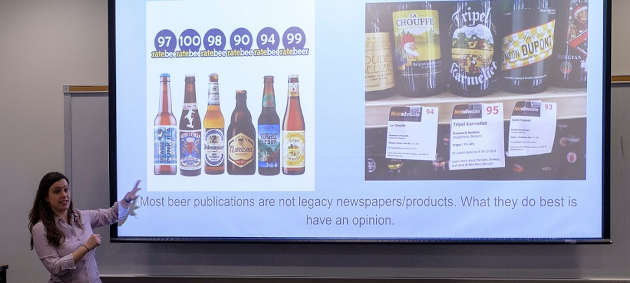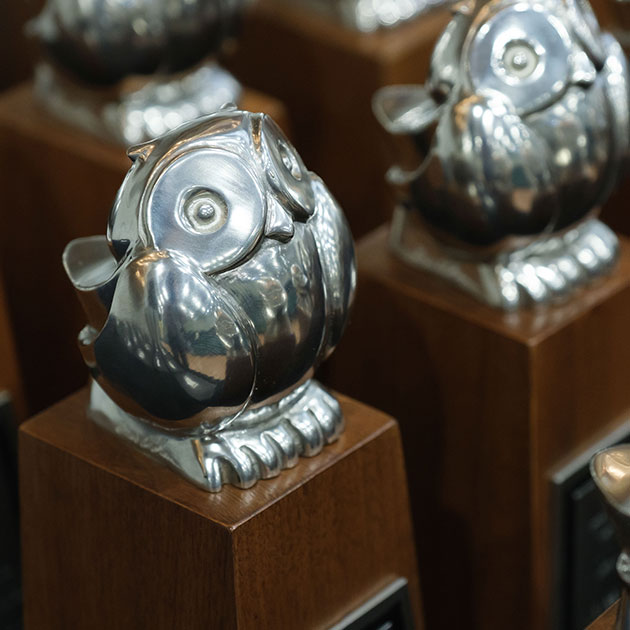Class looks at strategies of local breweries
Craft brewing contributed $4.9 billion to the Texas economy last year, according to Richard Harrison, PhD, an associate professor at The University of Texas at Dallas. Harrison, a self-described craft beer enthusiast, got the idea for a college course in craft brewing because of research from Stanford University on “resource partitioning theory” and craft beer: As big corporate brewers consolidated, it created space for smaller brewers to sell a wide variety of stouts, lagers and India pale ales.

His Strategy and Management in the Craft Brewing Industry class at UTD’s Naveen Jindal School of Management highlights one of the fastest-emerging areas of local business, said Tiney Ricciardi, craft beer journalist at The Dallas Morning News.
“People see opportunity in local beer,” said Ricciardi, a class guest speaker. “I think Professor Harrison’s class is … a sign that the North Texas beer industry is being taken seriously.” The craft beer boom was slow to hit North Texas, but when it did, it hit hard. Five years ago, there were five craft breweries in the area. Today, there are 60, employing “probably less than 1,000 workers,” Harrison said. But, he added, if you include beer distributors, workers in craft beer bars — all the employees upstream and downstream, the industry accounts for thousands of local jobs.
“Food and beverage startups have come a long way from kitchen cupcake sales and home brewing in the garage,” said Steve Guengerich, executive director of the Institute for Innovation and Entrepreneurship at UT Dallas. “Dr. Harrison’s class is a great reminder that every industry is ripe with opportunity for innovation and entrepreneurship. The next great startup isn’t necessarily another cryptocurrency or AI software startup.”
Students in Harrison’s class don’t drink beer – they dissected every aspect of the craft brewing business, from financing and production to cutting through the thicket of regulations before being able to sell a single pint of lager.
“There are a lot of hurdles breweries have to go through,” Harrison said.
Speakers in past classes included a representative from the Texas Alcoholic Beverage Commission, two reps of major beer distributors, and six local craft brewery owners. The owners included three UT Dallas graduates: Michael Peticolas, BA’95, of Peticolas Brewing Company; Joel Malone, BS’08, MBA’11 and MS’11, of Bishop Cider Co.; and David Wedemeier, BS’02 and MBA’05, of Martin House Brewing Company.
“Listening to all these different local industry experts taught me a lot about how you overcome challenges and become successful,” said Lance Bergstrom, an investor in the Dallas-based Manhattan Project Beer Company and a self-described “beer neophyte.”
Bergstrom was one of several students already involved in local craft brewing or hoped to find a job in the industry. It was “such a great, informative class, even for someone like me who just likes to drink all different kinds of beer,” said Dick Morrison, who works at a local manufacturing company. “I’ve learned the industry is changing and running a brewery is hard. You really need a couple million dollars just to get started.”
Adapting to a quickly evolving landscape was a recurring topic in the course. Ricciardi said corporate brewers are jumping on the craft beer bandwagon, threatening smaller business. She also said the rapid increase of local craft breweries might force some businesses to close and new breweries to scale back their launches.
“Before 2013, you had to go big or go home,” she said. “Now, I see the business model starting smaller and growing on demand.”
Students in the class confronted tough questions on how to approach such a fast-growing industry. Harrison said one conundrum is how to keep competition from ruining the cooperative nature of craft breweries.
“Right now, it’s a tight-knit network of people who don’t act like competitors,” he said. “If someone runs low on hops or grain, someone will loan them some. It’s almost like a social movement. Everyone helps each other.”
The bigger question, he said, is whether the industry can keep growing without losing its integrity and its customers. Last year, after MillerCoors bought Granbury-based Revolver Brewing, Harrison said he heard several local aficionados vow they would never drink Revolver beer again.
“Craft breweries are supposed to be small and independent and use hand-crafted methods. … Once you get bought by MillerCoors, what does that do to … consumer perception of your authenticity?” Harrison said. “An emerging industry like this has lot of interesting questions and not all the answers are clear.”





